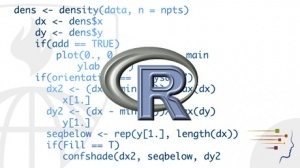Objectives
This course aims to give basic skills in R, but with some applications in the field of Evolutionary Ecology
This course can have a recognition of 6 ECTs for FCUL PhD students enrolling in it as part of their first doctoral year. For FCUL PhD students only requiring 5 ECTs recognized in their specific PhD programmes the last 6 hours of the course are not mandatory and the certificate will be on 'Topics in R without fear’.
Minimum formation: bachelor degree in Biology or related areas.
Directed to: PhD or MSc students in Biology, Evolution, Ecology or related areas, and postdocs and other professionals working in related topics.
Directed to: PhD or MSc students in Ecology, Geography or related areas, postdocs and professionals working in related topics
General Plan
Introduction to the R working environment
Variable types in R
Statistical populations and samples through working examples
Measurements of central tendency and variability
Precision, accuracy and bias
Hypothesis testing: Falsability, Type-I and II errors and statistical power
Correlation and simple regression
P-value vs. effect magnitude
Linear Models: residuals, assumptions and interpretation.
Explained vs. unexplained variance of a model (the coefficient of determination).
Building functions in R
Introduction to graphics in R
The concept of partial effect: partial regression and correlation
General Linear Models (GLM)
Curve fitting in linear models and General Additive Models (GAMs)
The problem of spatial autocorrelation in ecology and evolution
Multicolinearity: when is there a problem?
Additive vs. multiplicative effects: checking and plotting interactions
Introduction to General and Generalized Linear Mixed Models (GLMM)
Fixed vs. Random effects and implications for analysis: main R functions
Introduction to Bayesian statistics: the function MCMCglmm
Practical examples in evolutionary ecology:
The study of natural selection
Applications of linear models for quantitative genetics
Student’s case studies
Funding
Students fees.
Partners
n.a.
Fee
Free for 1st year PhD students in the Doctoral program in Biology (FCUL), Biodiversity, Genetics and Evolution (BIODIV UL; UP) and Biology and Ecology of Global Changes (BEAG UL, UA) when the course counts credits for their formation, in which case the delivery of a final report done after the course is mandatory; 25 € for PhD students from institutions of the PEERS network (cE3c, CFE); 125 € for FCUL Master students and unemployed; 180 € for BTI, BI and other PhD students; 250 € for Professional and postdocs.
When the maximum number of students is reached 12 vacancies will be available for non-paying 1st year PhD students mentioned above, being, by order of preference: 1) cE3c students; 2) BIODIV students (not from cE3c); 3) FCUL students (not from cE3c); 4) BEAG students (not from FCUL).
Candidates should send a short CV and a motivation letter to Jordi Moya-Laraño at the following email address: jordi@eeza.csic.es
jordi@eeza.csic.es

